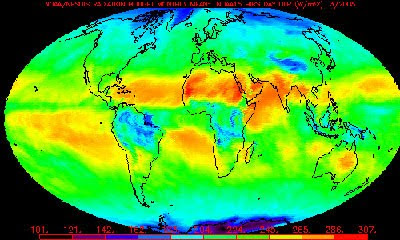Somehow in the chaos of the climate debate, skeptics and supporters alike have misunderstood the fundamental distinction of what is actually happening to our planet. If you are one of the many people unclear about the difference between weather and climate then this post is for you.
To illustrate the confusion (or willful misdirection of public discourse), please watch the clip from Fox & Friends below:
One sentence in particular should have jumped out at you. At second 32 co-host Steve Doocy quips, "Yeah that global warming thing is really kicking into high gear, isn't it?" after reporting freezing temperatures across the United States last week. Some (achem, Jon Stewart) are quick to jump at the hosts of Fox and Friends for the way they misinterpret and dumb down issues to push a conservative agenda, but I think this example may speak to a deeper lack of understanding that extends beyond the boundaries of liberal and conservative media wars.
Have you ever wondered about the integrity of the climate debate when you hear reports of a record snowfalls or sub-zero temperatures? Have you ever asked yourself how the climate can be changing and the globe can be warming if it still gets really really cold?
Let's set the record straight...
The essential difference between weather and climate is a matter of scope and timing. Simply put, according to excerpts from an elementary school primer included in this recent UN Dispatch article, weather is "the conditions in the atmosphere in a certain place during a certain time. Weather is always changing." Climate, on the other hand, is "what the weather is generally like over long periods of time, such as years or decades in a particular area. A place that has little rainfall has a dry climate, and a place that has high temperatures has a hot climate."
To further highlight the distinction between weather and climate consider the following quote from How to Talk to a Climate Skeptic, written by blogger Colby Beck and vetted by the climatologists at Real Climate. In his series, Beck outlines the many climate change denial arguments and offers responses to each one. Read his response to a weather-versus-climate oriented objection below:
Objection:
Scientists can't even predict the weather next week, so why should we believe what some climate model tells us about 100 years from now?
Answer:
Climate and weather are really very different things and the level of predictability is comparably different.
Climate is defined as weather averaged over a period of time, generally around 30 years. This averaging over time removes the random and unpredictable behaviour of weather. Think of it as the difference between trying to predict the height of the fifth wave from now that will come splashing up the beach versus predicting the height of tomorrow's high tide. The former is clearly quite a challenge, as your salty, wet sneakers will bear witness to, but the latter is routine and reliable.
This by no means says that it is necessarily easy to predict climate changes, but clearly seizing on the weather man's one week failure to cast doubt on a climate model's 100 year projection is an argument of ignorance.
Now that we've clearly established the meanings of weather and climate it is important to note that, as this Met Office article points out, although some regions have experienced lower-than-normal temperatures recently, it is not cooling everywhere. From Met Office: "North-east America, Canada, North Africa, the Mediterranean, and south-west Asia have all seen temperatures above normal - in many places by more than 5 °C, and in parts of northern Canada, by more than 10 °C." See the map below for the global temperature trends above and below the regional averages:
As it turns out, not only was Steve Doocy substituting weather patterns for climate trends, but even if we do use his logic, parts of the earth were warming during the same period. So the next time you hear your local weatherman remark, "It's going to be another cold one out there today folks!" don't make the same mistake Doocy did. Even if our days are colder (albeit in winter) and snowfalls are higher, the climate is still changing.

No comments:
Post a Comment